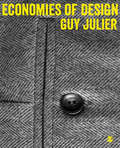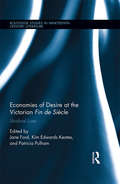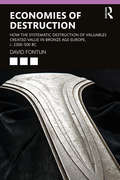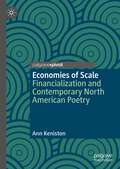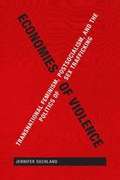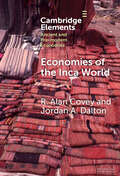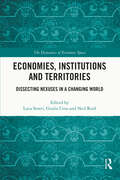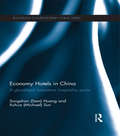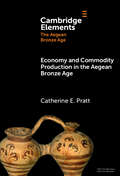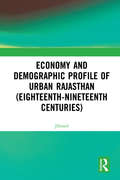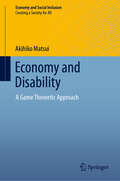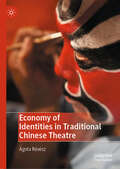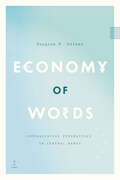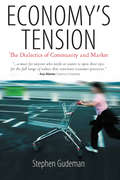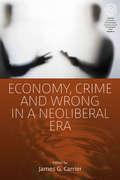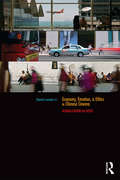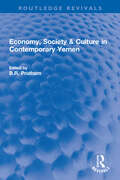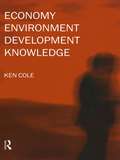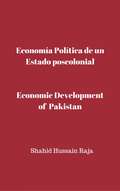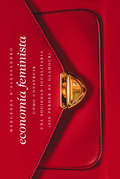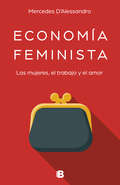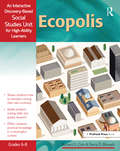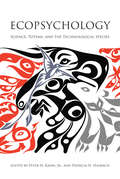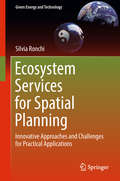- Table View
- List View
Economies of Design
by Guy JulierHow are the rise of design and neoliberalism connected? How does design change the way we operate as economic beings? What is the economic significance of design? Historically, design has been promoted for its for its capacity to add value to products and services. In contemporary capitalism, however, it assumes a more central and more complex role. Design today is both influenced by, and actively shapes, our economic systems. This ground-breaking book shines a spotlight on how design has become embedded in political economies. It reveals the multiple ways in which design has emerged as a vital feature of neoliberal economic systems, from urban strategies to commercial processes to government policy-making. Drawing on a range of global examples, Guy Julier: explains the economic processes of design explores the relationship between design and intellectual property discusses the role of design in the public sector highlights the impact of design in informal and alternative economies brings theory to life with case studies on home improvements, fast fashion, shopping centres and more. Economies of Design provides a thought-provoking new way of understanding and talking about the meanings of design in contemporary capitalism. It is an essential companion for students of design and the creative industries across the arts, humanities and social sciences.
Economies of Desire at the Victorian Fin de Siècle: Libidinal Lives (Routledge Studies in Nineteenth Century Literature)
by Patricia Pulham Jane Ford Kim Edwards KeatesThis volume marks the first sustained study to interrogate how and why issues of sexuality, desire, and economic processes intersect in the literature and culture of the Victorian fin de siècle. At the end of the nineteenth-century, the move towards new models of economic thought marked the transition from a marketplace centred around the fulfilment of ‘needs’ to one ministering to anything that might, potentially, be desired. This collection considers how the literature of the period meditates on the interaction between economy and desire, doing so with particular reference to the themes of fetishism, homoeroticism, the literary marketplace, social hierarchy, and consumer culture. Drawing on theoretical and conceptual approaches including queer theory, feminist theory, and gift theory, contributors offer original analyses of work by canonical and lesser-known writers, including Oscar Wilde, A.E. Housman, Baron Corvo, Vernon Lee, Michael Field, and Lucas Malet. The collection builds on recent critical developments in fin-de-siècle literature (including major interventions in the areas of Decadence, sexuality, and gender studies) and asks, for instance, how did late nineteenth-century writing schematise the libidinal and somatic dimensions of economic exchange? How might we define the relationship between eroticism and the formal economies of literary production/performance? And what relation exists between advertising/consumer culture and (dissident) sexuality in fin-de-siecle literary discourses? This book marks an important contribution to 19th-Century and Victorian literary studies, and enhances the field of fin-de-siècle studies more generally.
Economies of Destruction: How the systematic destruction of valuables created value in Bronze Age Europe, c. 2300-500 BC
by David FontijnWhy do people destroy objects and materials that are important to them? This book aims to make sense of this fascinating, yet puzzling social practice by focusing on a period in history in which such destructive behaviour reached unseen heights and complexity: the Bronze Age and Early Iron Age in Europe (c. 2300–500 BC). This period is often seen as the time in which a ‘familiar’ Europe took shape due to the rise of a metal-based economy. But it was also during the Bronze Age that massive amounts of scarce and recyclable metal were deliberately buried in the landscape and never taken out again. This systematic deposition of metalwork sits uneasily with our prevailing perception of the Bronze Age as the first ‘rational-economic’ period in history – and therewith – of ourselves. Taking the patterned archaeological evidence of these seemingly un-economic metalwork depositions at face value, it is shown that the ‘un-economic’ giving-up of metal valuables was an integral part of what a Bronze Age ‘economy’ was about. Based on case studies from Bronze Age Europe, this book attempts to reconcile the seemingly conflicting political and cultural approaches that are currently used to understand this pivotal period in Europe’s deep history. It seems that to achieve something in society, something else must be given up. Using theories from economic anthropology, this book argues that – paradoxically – giving up that which was valuable created value. It will be invaluable to scholars and archaeologists interested in the Bronze Age, ancient economies, and a new angle on metalwork depositions.
Economies of Scale: Financialization and Contemporary North American Poetry (Palgrave Studies in Literature, Culture and Economics)
by Ann KenistonThis book offers the first sustained study of the ways 21st century North American poems engage with financialization. It argues that recent poems about economics not only discuss but enact concerns with containment and agency essential to the contemporary financialized economy by manipulating the seemingly old-fashioned figures of synecdoche (the representation of the whole by the part) and prosopopeia or personification. Its four body chapters offer in-depth readings of the work of eleven formally, culturally, and thematically diverse contemporary U.S. and Canadian poets who variously consider labor, consumerism, debt, and the derivative form; the Coda reads several recent poems about reparations in terms of an emerging tendency to emphasize the historical, racialized, and ethical contexts of contemporary economics. As the book explores financialization’s representation in recent poetry, it redresses arguments that poetry is irrelevant to contemporary culture.
Economies of Violence: Transnational Feminism, Postsocialism, and the Politics of Sex Trafficking
by Jennifer SuchlandRecent human rights campaigns against sex trafficking have focused on individual victims, treating trafficking as a criminal aberration in an otherwise just economic order. In Economies of Violence Jennifer Suchland directly critiques these explanations and approaches, as they obscure the reality that trafficking is symptomatic of complex economic and social dynamics and the economies of violence that sustain them. Examining United Nations proceedings on women's rights issues, government and NGO anti-trafficking policies, and campaigns by feminist activists, Suchland contends that trafficking must be understood not solely as a criminal, gendered, and sexualized phenomenon, but as operating within global systems of precarious labor, neoliberalism, and the transition from socialist to capitalist economies in the former Soviet Union and Eastern Bloc. In shifting the focus away from individual victims, and by underscoring trafficking's economic and social causes, Suchland provides a foundation for building more robust methods for combatting human trafficking.
Economies of the Inca World (Elements in Ancient and Pre-modern Economies)
by R. Alan Covey Jordan A. DaltonThe Inca Empire (c. 1400–1532) was the largest Indigenous state to develop in the Americas, spanning the extraordinarily rich landscapes of the central Andes. Scholarly approaches to Inca-era economies initially drew on Spanish colonial documents that emphasized royal resource monopolies, labor tribute, and kin-based land tenure. Anthropologists in recent decades have emphasized local economic self-sufficiency and the role of reciprocity in Inca economics. This Element adds to the existing literature by reviewing recent archaeological research in the Inca capital region and different provinces. The material evidence and documents indicate considerable variation in the development and implementation of Inca political economy, reflecting an array of local economic practices that were tailored to different Andean environments. Although Inca economic development downplayed interregional trade, emerging evidence indicates the existence of more specialized trading practices in Inca peripheral regions, some of which persisted under imperial rule.
Economies, Institutions and Territories: Dissecting Nexuses in a Changing World (The Dynamics of Economic Space)
by Neil Reid Luca Storti Giulia UrsoPresenting multidisciplinary and global insights, this book explores the nexus between economies, institutions, and territories and how global phenomena have local consequences. It examines how original and innovative economic related processes embed themselves in societies at the local level; how boundaries between the state and the market are placed under stress by unexpected changes. It explores whether new types of elites and forms of social inequalities are emerging as a result of institutional and economic changes, and whether peripheral areas are experiencing insidious forms of economic and institutional lock-in. Presenting empirical cases and useful analytical and conceptual tools, the book makes current economic and territorial phenomena more understandable. This is an important read for students and scholars in the fields of geography, sociology, political sciences, anthropology, economics, regional science, and international relations. It is also a valuable resource for policymakers, well-educated lay readers and economic, political and international relations journalists.
Economy Hotels in China: A Glocalized Innovative Hospitality Sector (Routledge Contemporary China Series)
by Songshan Huang Xuhua SunWhile economy or budget hotels have been popular in western countries since the end of the Second World War, they have only emerged as a sector in their own right in China since the mid-1990s. Indeed, as a new service industry sector, economy hotels in China demonstrate important characteristics which can be used to illustrate and help explain China’s current economic progress more generally. This book provides a comprehensive overview of the economy hotel sector in China. It covers macro-level social-cultural, economic, environmental, geographic and development issues, alongside micro-level consideration of the budget hotel companies’ innovative management and marketing procedures, business expansion strategies, general hotel management and operation issues, as well as an analysis of some leading entrepreneurs in the sector, and in-depth case studies examining the most successful economy hotel companies in China. Huang and Sun argue that the rapid development of budget hotels in China demonstrates how, under the influence of globalisation, Chinese businesses have become more innovative as they apply successful western business models to China. In turn, they show that the China model is fundamentally different in terms of its driving force, which lies purely in its domestic travel market, fuelled by China's continued economic growth. There is therefore much to explore about both China’s market situation and business practices in the economy hotel sector and this book makes an important contribution to our understanding of China’s new business environment. Based on extensive fieldwork and investigation, Economy Hotels in China will be welcomed by students and scholars of tourism, hospitality, business studies and Chinese studies, but it will also appeal to practitioners of business management in these sectors who are interested in China’s development and business opportunities in China.
Economy and Commodity Production in the Aegean Bronze Age (Elements in The Aegean Bronze Age)
by Catherine E. PrattThis Element does not discuss every aspect of the economy. Rather, it focuses on the first stage of an economic cycle − that of production. Two of the major guiding questions are: What products were the Bronze Age palatial states concerned with producing in surplus? And how did the palatial states control the production of these essential commodities? To answer these questions, the Element synthesizes previous work while interspersing its own conclusions on certain sub-topics, especially in light of recent archaeological data that help to fill out a picture incomplete based on textual evidence alone. With these goals in mind, this Element brings together both textual and archaeological data to reconstruct the internal economy and the production of commodities under the purview of Minoan and Mycenaean palatial states.
Economy and Demographic Profile of Urban Rajasthan (Eighteenth-Nineteenth Centuries)
by JibraeilThe volume deals with the inter-relations between agricultural production, agrarian trade, markets, towns and population of urban Rajasthan in the eighteenth-nineteenth centuries. This study also displays that how the higher receipts from sair-jihat (non-agrarian taxes) in various areas of Rajasthan, worked in the evolution of agrarian markets into qasbas. On the same line the volume shows the fall in industrial activity in the nineteenth century which broadly corresponds with the theory of de-industrialization and de-urbanization. Please note: Taylor & Francis does not sell or distribute the Hardback in India, Pakistan, Nepal, Bhutan, Bangladesh and Sri Lanka.
Economy and Disability: A Game Theoretic Approach (Economy and Social Inclusion)
by Akihiko MatsuiSociety has developed so that it accommodates the needs of intertwined people, but a question arises as to which people have been accommodated. Has everyone been taken care of in an equal manner? If not, who has fallen into the gap between the institutions that are supposed to accommodate them? This book is a study of these issues of economy and disability using game theory, which has provided a means of analyzing various social phenomena. Part I provides actual cases related to economy and disability, with the stories based on interviews by the author. Part II is geared toward a game theoretic analysis. This book explains disability-related issues by game theory and innovates that theory by deeply contemplating the issues.It is not common that first-rate theorists manage to make their research relevant and applicable to the most pressing problems our society faces these days. This is the remarkable achievement of this book. Akihiko Matsui, an internationally recognized leader in economic theory, succeeds in bringing profound game theoretical insights to the questions of disability, the social norms relating to it, and the ethical and economic problems they raise. The book is a tour de force, brilliantly combining economic and sociology, mathematics and philosophy, to provide us a fresh look at the way we run modern societies.Itzahk Gilboa, Professor, Eitan Berglas School of Economics, Tel-Aviv University and Professor of Economics and Decision Sciences, HEC, ParisThe present world faces a broad range of societal problems such as discrimination against minorities and conflicts between groups. The market mechanism may solve some of these dilemmas, but many others remain. This book targets various societal problems and provides game theoretical approaches to them, stressing the importance of social institutions including the market system and individual interactive attitudes to society. Aki Matsui’s splendid Economy and Disability is indispensable for students and scholars interested in social science, particularly in economic theory, and gives a better understanding of these phenomena and their potential cures.Mamoru Kaneko, Professor, Faculty of Political Science and Economics, Waseda UniversityIn this book, Aki Matsui is revealed to be a fully-fledged humanist in the guise of a game theoretician. He beautifully presents game-theoretical ideas while at the same time suggesting how society should relate to the disabled. This unique combination makes Economy and Disability—apart from anything else—a truly moving book.Ariel Rubinstein, Professor of Economics, Eitan Berglas School of Economics, Tel-Aviv University and Professor of Economics, New York University
Economy of Identities in Traditional Chinese Theatre
by Ágota RévészThe book is intended to become a useful reference for theatre people who need “China knowledge”. Its central questions are: how is traditional Chinese theatre (“Chinese opera”, i.e. xiqu) embedded in contemporary Chinese society? What identities are created through theatre? And, most importantly: how are these identities related to one another to form a complex “economy of identities”? An insight is offered into the traditional Chinese theatre system composed of over three hundred theatre types vying for recognition in a complex relational network. Understanding how this “relationality” works might also shed light on the functioning of other fields in the current socio-cultural complex of China.
Economy of Words: Communicative Imperatives in Central Banks
by Douglas R. HolmesMarkets are artifacts of language—so Douglas R. Holmes argues in this deeply researched look at central banks and the people who run them. Working at the intersection of anthropology, linguistics, and economics, he shows how central bankers have been engaging in communicative experiments that predate the financial crisis and continue to be refined amid its unfolding turmoil—experiments that do not merely describe the economy, but actually create its distinctive features. Holmes examines the New York District Branch of the Federal Reserve, the European Central Bank, Deutsche Bundesbank, and the Bank of England, among others, and shows how officials there have created a new monetary regime that relies on collaboration with the public to achieve the ends of monetary policy. Central bankers, Holmes argues, have shifted the conceptual anchor of monetary affairs away from standards such as gold or fixed exchange rates and toward an evolving relationship with the public, one rooted in sentiments and expectations. Going behind closed doors to reveal the intellectual world of central banks,Economy of Words offers provocative new insights into the way our economic circumstances are conceptualized and ultimately managed.
Economy's Tension: The Dialectics of Community and Market (Berghahn Ser.)
by Stephen GudemanWhy are we obsessed with calculating our selections? The author argues that competitive trade nurtures calculative reason, which provides the ground for most discourses on economy. But market descriptions of economy are incomplete. Drawing on a range of materials from small ethnographic contexts to global financial markets, the author shows that economy is dialectically made up of two value realms, termed mutuality and impersonal trade. One or the other may be dominant; however, market reason usually cascades into and debases the mutuality on which it depends. Using this cross-cultural model, the author explores mystifications of economic life, and explains how capital and derivatives can control an economy. The book offers a different conception of economic welfare, development, and freedom; it presents an approach for dealing with environmental devastation, and explains the growing inequalities of wealth within and between nations.
Economy, Crime and Wrong in a Neoliberal Era (EASA Series #36)
by James G. CarrierCorporate scandals since the 1990s have made it clear that economic wrong-doing is more common in Western societies than might be expected. This volume examines the relationship between such wrong-doing and the neoliberal orientations, policies, and practices that have been influential since around 1980, considering whether neoliberalism has affected the likelihood that people and firms will act in ways that many people would consider wrong. It furthermore asks whether ideas of economic right and wrong have become so fragmented and localized that collective judgement has become almost impossible.
Economy, Emotion, and Ethics in Chinese Cinema: Globalization on Speed (Routledge Contemporary China Series)
by David Leiwei LiThe First and Second Comings of capitalism are conceptual shorthands used to capture the radical changes in global geopolitics from the Opium War to the end of the Cold War and beyond. Centring the role of capitalism in the Chinese everyday, the framework can be employed to comprehend contemporary Chinese culture in general and, as in this study, Chinese cinema in particular. This book investigates major Chinese-language films from mainland China, Taiwan, and Hong Kong in order to unpack a hyper-compressed capitalist modernity with distinctive Chinese characteristics. As a dialogue between the film genre as a mediation of microscopic social life, and the narrative of economic development as a macroscopic political abstraction, it engages the two otherwise remotely related worlds, illustrating how the State and the Subject are reconstituted cinematically in late capitalism. A deeply cultural, determinedly historical, and deliberately interdisciplinary study, it approaches "culture" anthropologically, as a way of life emanating from the everyday, and aesthetically, as imaginative forms and creative expressions. Economy, Emotion, and Ethics in Chinese Cinema will appeal to students and scholars of Chinese cinema, cultural studies, Asian studies, and interdisciplinary studies of politics and culture.
Economy, Society & Culture in Contemporary Yemen (Routledge Revivals)
by B. R. PridhamFirst published in 1985, Economy, Society & Culture in Contemporary Yemen was written to present a wealth of research and thinking that was new to the field at the time of original publication. The book covers a wide range of topics, including socio-economic development, agriculture, land use, fiscal policies, emigration, health, education, and politics. In doing so, it provides a close analysis of the situation in Yemen in the 1980s whilst exploring recent developments of the preceding years. It will appeal to those with an interest in the history of Yemen.
Economy-Environment-Development-Knowledge
by Ken ColeAs we approach the end of the second millennium, we find ourselves in times of radical social change. Orthodox explanations of the economy, the environment and the development process are unable to provide coherent policies for such issues as employment creation, environmental degradation and social progress.Economy-Environment-Development-Knowledge provides alternative perspectives on these fundamental aspects of human existence. Economists, environmentalists, and development theorists have so far been unable to agree on the most successful prescriptions to address problems. To understand, contrast and compare alternative understandings of economic, environmental and development issues, we need to be aware why theorists conceptualise the process of social experience so differently.Part 1 of Economy-Environment-Development-Knowledge addresses the subjective preference, cost-of-production and abstract labour theories of values in economics; Part 2 explains egocentrism, ecocentrism and socioecocentrism as competing theoretical perspectives in environmental theory; Part 3 highlights modernisation theory, structuralist theory and class struggle as ways to account for the process of development and Part 4 examines the generation of knowedge through positivism, paradigms and praxis, legitimating competing perspectives in economics, environmentalist and development. The book concludes by considering why different people find alternative explanations more or less plausible.By addressing the disagreements between theorists, Economy-Environment-Development-Knowledge provides a unique basis to contrast and compare the plethora of theories of, and policies for, economic prosperity, environmental sustainability and social progress.
Economía Política de un Estado poscolonial
by Shahid Hussain Raja Cristian Márquez RomoLa idea de escribir esta breve introducción sobre la historia del desarrollo económico de Pakistán vino a mi mente después de escribir un artículo de dos partes, acerca de la experiencia de desarrollo del primer gobierno militar de Pakistán, que gobernó el país durante la década de 1958 a 1968. El artículo fue publicado en dos entregas para el extinto periódico The Muslim durante la última semana de septiembre de 1979, apreciado por su capacidad para sintetizar el debate sobre las políticas implementadas durante el régimen de Ayub, así como sus consecuencias en el corto y largo plazo. Después traté de darle seguimiento, escribiendo ensayos de largo aliento acerca de los periodos sucesivos en la historia del desarrollo de Pakistán. Sin embargo, debido a la escasez de tiempo con que contaba durante el servicio, no tuve la oportunidad de completar el ejercicio, por lo que después de retirarme decidí regresar a trabajar en ello. Lo que tienes en tus manos es el primer volumen: un libro breve que aborda seis décadas de historia del desarrollo económico de Pakistán. En el segundo volumen discutiré los retos que Pakistán enfrenta en general, así como en términos de economía política en particular. Finalmente, pretendo plantear en qué medida se puede responder a dichos retos, de la mano de un plan de acción para hacerlo. Libre de jerga innecesaria, notas y gráficas, este libro se ubica a caballo entre un artículo que puede ser leído de una sola vez y un libro que podría llevar varios días. En cualquier caso, escribí este libro principalmente para estudiantes de estudios del desarrollo, y para lectores en general, pero puede ser útil para economistas, estudiantes, legisladores y servidores públicos, utilizándolo como un breve manual y diagnóstico de 60 años del trayecto de un Estado poscolonial, con una perspectiva sobre los cambios globales como telón de fondo. Especialmente busca plantear algunas preguntas –¿Qué salió
Economía feminista: Cómo construir una sociedad igualitaria (sin perder el glamour)
by Mercedes D'alessandroEscrito por una economista y apoyado en evidencia estadística, "Economía feminista" propone una mirada que sacude a la economía como ciencia y plantea nuevas dimensiones a las viejas discusiones sobre desigualdad y pobreza al tiempo que aporta ideas para construir una sociedad más igualitaria y justa. ¿Hay una inclinación natural en las mujeres por enseñar y en los varones por construir? ¿Nacen las bebas con una escoba bajo el brazo y los bebés con taladros? ¿Por qué el trabajo doméstico no remunerado es "cosa de mujeres"? ¿Por qué sólo el 4% de las empresas más grandes del mundo tiene una CEO? ¿Cómo es que en 2016 la mayoría de los países nunca ha tenido una presidenta? Para responder estas preguntas Mercedes D'Alessandro, economista, propone un viaje al lado menos visible de la desigualdad, un recorrido que atraviesa las ideas centrales de la economía y muestra los nuevos desafíos que enfrentan las mujeres hoy: la brecha salarial, su rol como amas de casa desesperadas, la pobreza sexista. Basado en evidencia estadística, Economía feminista cuestiona estereotipos y postula una reflexión profunda sobre nuestras relaciones sociales; al mismo tiempo, aporta ideas inspiradoras para la construcción de un futuro más igualitario y por lo tanto más justo. Porque la igualdad es un negocio para todos, y porque las mujeres ganan menos que los varones en todo el planeta, ¡y tu mamá también! «Las mujeres, mitad de la población mundial, hoy son minoría en todos los ámbitos en los que se toman decisiones de peso y donde se piensa nuestra época: parlamentos, gobiernos, ciencia, medios de comunicación, empresas multinacionales, tecnología, arte, filosofía, literatura. Disputar estos lugares implica transformar el modo en el que hemos pensado el rol de la mujer en toda la historia pasada. Es un cambio muy profundo... que ya comenzó y que es irreversible.» «Las mujeres han sido entrenadas durante siglos en las delicadas artes del cuidado del hogar y de otras personas, y todavía sienten eso como un mandato de su naturaleza, un atributo de la feminidad. "Yo me quedo en casa porque amo a mis hijos." ¿Es que irse del hogar significa desamor? ¿Por qué nunca está en juego que quien se quede en la casa sea el padre?» «La reorganización de las tareas domésticas y de los cuidados es una cuestión existencial. Implica pensar en quién se ocupa, no sólo entre las mujeres y los varones, sino también si los servicios que se contratan en el mercado tienen que estar profesionalizados. Quién paga qué cosas, cuáles son las necesidades que el Estado tiene que cubrir, qué les corresponde a las empresas. Quién cuida y cría a los niños. Qué lugar se le da a la familia y, también, qué es una familia.»
Economía feminista: Economía y feminismo unidos para revolucionar ideas y estereotipos del presente
by Mercedes D'AlessandroEconomía feminista propone, basándose en evidencias estadísticas, una mirada que cuestiona la economía como ciencia y plantea nuevas dimensiones a las viejas disputas sobre desigualdad y pobreza, al tiempo que aporta ideas para construir una sociedad más igualitaria y justa. Economía feminista presenta una mirada que sacude todo el esqueleto conceptual de la economía como ciencia y plantea nuevas dimensiones a las viejas discusiones sobre desigualdad o pobreza. D´Alessandro profundiza sobre la brecha salarial, el trabajo no remunerado, el papel de la maternidad en las posibilidades profesionales de la mujer, la feminización de la pobreza y el techo de cristal al que nos enfrentamos las mujeres en la política y el mundo laboral. «Las mujeres, la mitad de la población mundial, hoy son minoría en todos los ámbitos en los que se toman decisiones de peso. Disputar estos lugares implica transformar el modo enel que hemos pensado el rol de la mujer en toda la historia pasada. Es un cambio muy profundo... que ya comenzó y que es irreversible. La economía feminista es revolucionaria o no es, porque no se puede conseguir igualdad en un mundo de opresión, porque no hay igualdad en un mundo de pobreza, porque no hay igualdad en un mundo de explotación.»Mercedes D'Alessandro
Ecopolis: An Interactive Discovery-Based Social Studies Unit for High-Ability Learners (Grades 6-8)
by Richard Cote Darcy BlauveltThe Interactive Discovery-Based Units for High-Ability Learners, for grades 6-8, provide teachers with opportunities to use exciting and challenging units in their classrooms. These engaging curriculum units culminate in authentic performance platforms that provide students with open-ended opportunities to demonstrate academic understanding. Each book in the series contains tiered lessons that teachers can easily modify to meet individual students' needs. Ecopolis has students run their own government to learn about issues including scarcity, resource allocation, needs vs. wants, opportunity costs, entrepreneurship, and global interdependence.
Ecopsychology: Science, Totems, and the Technological Species
by Jr. Peter H. Kahn Patricia H. HasbachAn ecopsychology that integrates our totemic selves—our kinship with a more than human world—with our technological selves.We need nature for our physical and psychological well-being. Our actions reflect this when we turn to beloved pets for companionship, vacation in spots of natural splendor, or spend hours working in the garden. Yet we are also a technological species and have been since we fashioned tools out of stone. Thus one of this century's central challenges is to embrace our kinship with a more-than-human world—"our totemic self"—and integrate that kinship with our scientific culture and technological selves.This book takes on that challenge and proposes a reenvisioned ecopsychology. Contributors consider such topics as the innate tendency for people to bond with local place; a meaningful nature language; the epidemiological evidence for the health benefits of nature interaction; the theory and practice of ecotherapy; Gaia theory; ecovillages; the neuroscience of perceiving natural beauty; and sacred geography. Taken together, the essays offer a vision for human flourishing and for a more grounded and realistic environmental psychology.
Ecosickness in Contemporary U.S. Fiction
by Heather HouserThe 1970s brought a new understanding of the biological and intellectual impact of environmental crises on human beings, and as efforts to prevent ecological and human degradation aligned, a new literature of sickness emerged. "Ecosickness fiction" imaginatively rethinks the link between ecological and bodily endangerment and uses affect and the sick body to bring readers to environmental consciousness.Tracing the development of ecosickness through a compelling archive of modern U.S. novels and memoirs, this study demonstrates the mode's crucial role in shaping thematic content and formal and affective literary strategies. Examining works by David Foster Wallace, Richard Powers, Leslie Marmon Silko, Marge Piercy, Jan Zita Grover, and David Wojnarowicz, Heather Houser shows how these authors unite experiences of environmental and somatic damage through narrative affects that draw attention to ecological phenomena, organize perception, and convert knowledge into ethics. Traversing contemporary cultural studies, ecocriticism, affect studies, and literature and medicine, Houser juxtaposes ecosickness fiction against new forms of environmentalism and technoscientific innovations such as regenerative medicine and alternative ecosystems. Ecosickness in Contemporary U.S. Fiction recasts recent narrative as a laboratory in which affective and perceptual changes both support and challenge political projects.
Ecosystem Services for Spatial Planning: Innovative Approaches and Challenges for Practical Applications (Green Energy and Technology)
by Silvia RonchiThe book investigates the relationship between ecosystem services (ES) and spatial planning, and explores potential means of integrating the two concepts to support the decision-making process. In addition, it presents case studies demonstrating the outcomes, limitations, opportunities and further new developments in ES assessment/mapping for planning support. Then it describes the “Restart from Ecosystem Services” (RES) methodology, which is aimed at integrating ES into the planning process using an ecological balance, and at promoting new planning parameters for the transformation areas. RES ensures the inclusion of ES in planning processes using the incremental measures of limiting, mitigating and compensating soil sealing and land take process promoting operational strategies in applying it. The implementation of RES is associated with strategic environmental assessment and provides valuable support in the definition of strategies across the entire planning process, especially for the evaluation of alternative scenarios.
